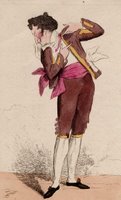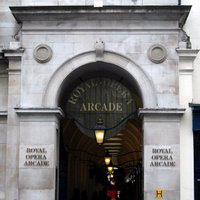 I do big chunks of writing on Saturday afternoons. That’s when the Metropolitan Opera broadcasts live, and I find it interesting that opera, or the human voice, helps me write. Most of the music I listen to when I write is vocal, for reasons I can’t quite fathom–sure, opera has all that passion and over-the-top emotion, and it’s all about love, jealousy, revenge, murder, and dying twice in a sack.
I do big chunks of writing on Saturday afternoons. That’s when the Metropolitan Opera broadcasts live, and I find it interesting that opera, or the human voice, helps me write. Most of the music I listen to when I write is vocal, for reasons I can’t quite fathom–sure, opera has all that passion and over-the-top emotion, and it’s all about love, jealousy, revenge, murder, and dying twice in a sack.
I find, too, that real, hardcore opera fans are rather like trad regency fans in their enthusiasm and encyclopaedic knowledge. Just listen to the half-time, sorry, intermission quiz at the Met, where a panel of experts answer opera trivia questions.
So what was a visit to the opera like in the regency period? First, you got value for money. An evening at the opera was l-o-n-g, though not in the sense of Ring Cycle long. It wasn’t entirely about the music, although people cared passionately about particular singers and might pause in their card-playing, drinking, or socializing to listen to a popular aria. Then as now, operas featured fabulous costumes and great sets and stage effects.
The major London theater for opera was The King’s Theatre, Haymarket, renamed Her Majesty’s Theatre (its current name) in 1837 when Victoria came to the throne. Like most historic London theaters, it burned down regularly during its history, and the Regency-era version, the second on the site, opened in 1791. It was the venue for the London premiers of many of Mozart’s operas.

A popular star was Giuseppe Naldi, seen here as Figaro in The Marriage of Figaro, which made its London debut in 1812 (although the opera had had an amateur performance in 1810 and its tunes were already well known–the Coldstream Guards had adopted Non piu andrai, one of the opera’s greatest hits, as its slow march in 1787). Naldi, not apparently a terrific singer but popular for his acting and warm personality, was something of a Mozart comic specialist, appearing as Leporello in Don Giovanni (which debuted at the King’s Theatre in 1816) and Papageno in The Magic Flute.

Sadly the King’s Theatre burned down again in 1867, but the Royal Opera Arcade, built behind the theater by John Nash and George Reston in 1816-1818 still survives.
But back to my original topic. What do you like to listen to when you write, or read? Do you have books you associate with particular music? Favorite London theaters, operas, great performances…?

Funny, I’m the opposite. I like vocal music, including opera, but words distract me too much while I’m writing, so I put on something instrumental for that. Sometimes I pick the music based on what I’m writing. If my characters love music, I’ll immerse myself in what they like to listen to–it was Mozart in LADY DEARING’S MASQUERADE. I also like impressionistic music (Debussy, Ravel) when writing more sensual scenes.
But I do listen to opera for fun and research. I’ve written scenes at the King’s Theatre in two of my own books. In one, the heroine masquerades as an opera dancer, and in the latest, LDM, my characters go to see the London premiere of Figaro.
Elena
As a big opera fan, I’ve sometimes wished I could go back in time for just one evening and see what a performance would be like! 🙂 Some of my favorites are Marriage of Figaro, Tosca, and La Traviata (a friend of mine hates this opera because she can’t stand the whole “lingering death” thing! Which I, morbidly, love. It’s amazing when a character can sing for twenty minutes straight while dying of tuberculosis)
I sometimes listen to opera while writing, it all depends, like Elena, on what I’m trying to write. I’ve listened to a lot of lute music and madrigals while working on my current Renaissance-set project. My family thinks I am crazy for owning so many CDs of lute music…
I can’t listen to music when reading, and I have to mute the tv when reading as well. I never shut it off, because seeing how I pretty much only every have CNN on, I have to know when the words breaking news come on so I can listen. But anyway. . . LOL Now back in the days (a few years ago) when I took the M13 bus to college and I wanted to read, I obviously couldn’t mute everyone talking, so I somehow was able to block them out.
As for the opera, no, I haven’t been to anything even remotely like one, just been to a couple of plays in my day in high school, but having read a few Regencies with scenes at the Opera or Theater, (and at the risk of sounding dumb! LOL), I’m amazed that there were any stars or that people knew what was going on the stage for the most part seeing how people went there just to see each other and been seen! 🙂
Lois
I’m amazed that there were any stars or that people knew what was going on the stage for the most part seeing how people went there just to see each other and been seen! 🙂
Very true, Lois! In the opera scenes I’ve written few of my characters pay attention (shame on them).
Elena